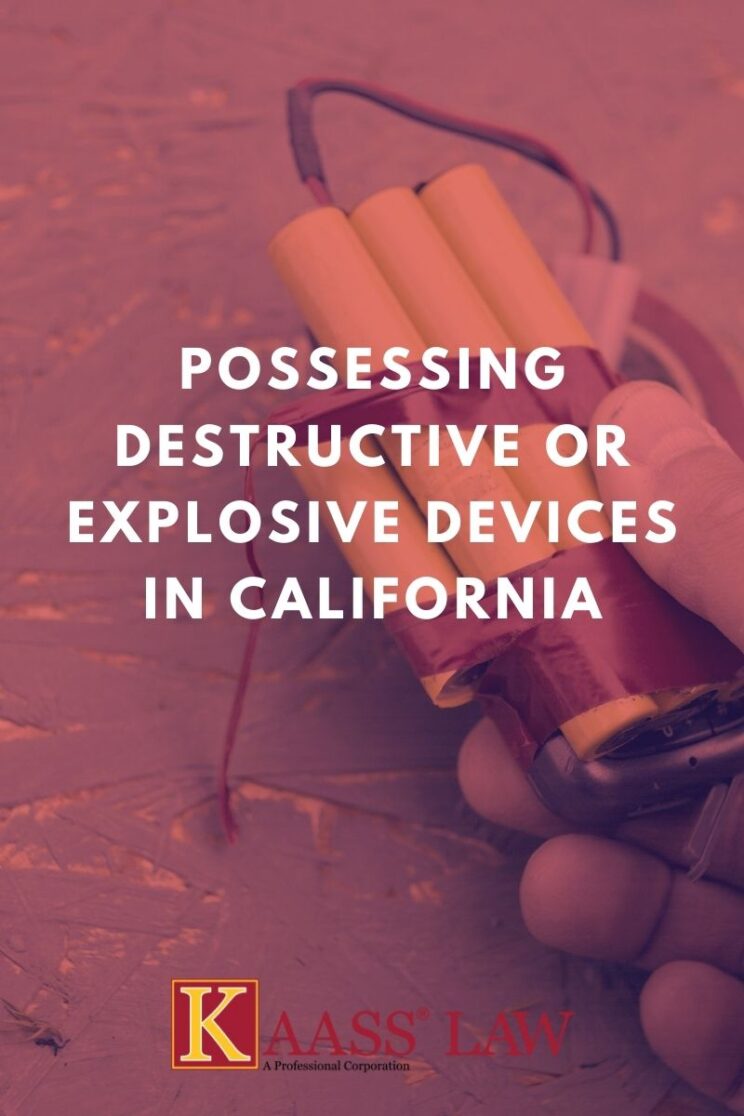California Penal Code Section 18710 prohibits the illegal possession of destructive devices other than fixed ammunition of a caliber greater than 0.60 inches.
What Must the Prosecution Prove In Order to Be Found Guilty of Penal Code 18710 Possessing Destructive or Explosive Devices?
The prosecutor must establish the following elements to prove that the defendant is guilty under California PC Section 18710 possessing destructive or explosive devices.
- Defendant possessed a destructive device
- Defendant was aware that he was possessing a destructive device
- Defendant was aware that what he possessed was a destructive device.
What is Considered a Destructive Device in California?
In California a destructive device is defined as the following:
- Any projectile which contains an incendiary or explosive material or any other chemical substance including tracer or incendiary ammunition, other than tracer ammunition designed for use in shotguns
- Any explosive missile, grenade, bomb, or similar device or any launching device
- Any rocket, rocket-propelled projectile or similar device with a diameter greater than 0.60 inch
- Any breakable container which contains a flammable liquid with a flashpoint of 150 degrees Fahrenheit or less with a wick or similar device capable of being ignited
- Any weapon greater than 0.60 caliber which fires fixed ammunition, or any other ammunition for such a weapon
- Any sealed device which contains dry ice or other chemically reactive material assembled for causing an explosion.
In California, there are many prohibited devices and weapons and some of them include bombs, missiles, rocket or grenade launchers, and land mines
Possession of a Destructive Device
According to California law possession of destructive devices can be actual and constructive. Actual possession is when the defendant has the dives in his physical possession. Constructive possession occurs when a defendant has control over the device but doesn’t have actual possession over it. Consequently, a defendant doesn’t have to actually touch or hold the device for it to qualify as a possession.
What are the Penalties for A California PC Section 18710 Conviction?
Penalties for a PC section 1817 conviction is a wobbler and can be punished as either a misdemeanor or a felony, depending on the defendant’s criminal history and the case facts.
What are the Penalties for A Misdemeanor Penal Code 18710 Conviction?
Penalties for misdemeanor penal code 18710 conviction include the following:
- Up to one year in s county jail
- A fine of up to $1,000
What are the Penalties for A Felony Penal Code 18710 Conviction?
Penalties for felony penal code 18710 conviction include the following:
- Sixteen months, two or three years in California state prison
- A fine of up to $10,000
Penalty Enhancement Under PC 18715
Under PC 18715 reckless or malicious possession of a destructive device in the following locations can increase the sentence:
- A public street or highway
- In or near a school, college, hotel, theater, hall, church, or any other public building
- In or near a private residence
- In, on, or near a railway passenger train, aircraft, cable road, car, cable car, or vessel that carries transports passengers;
- In any public place passed by human beings.
The defendant will face felony penalties of two, four, or six years in state prison.
What are the Penalties for a PC 18740 Conviction?
In case the prosecutor establishes that defendant had the intention to intimidate, injure, or terrify a person, or to wrongfully destroy or injure or property under PC 18740 the penalties include three, five, or seven years in state prison.
What are the Penalties for a PC 18750 Conviction?
In case the defendant had malicious intent to injure another person with the device under under PC 18755 the penalties include five, seven, or nine years imprisonment in state prison.
What are the Penalties for a PC 18755 Conviction?
In case the defendant caused death to another person under PC 18755, the penalties include a life sentence without the possibility of parole.

